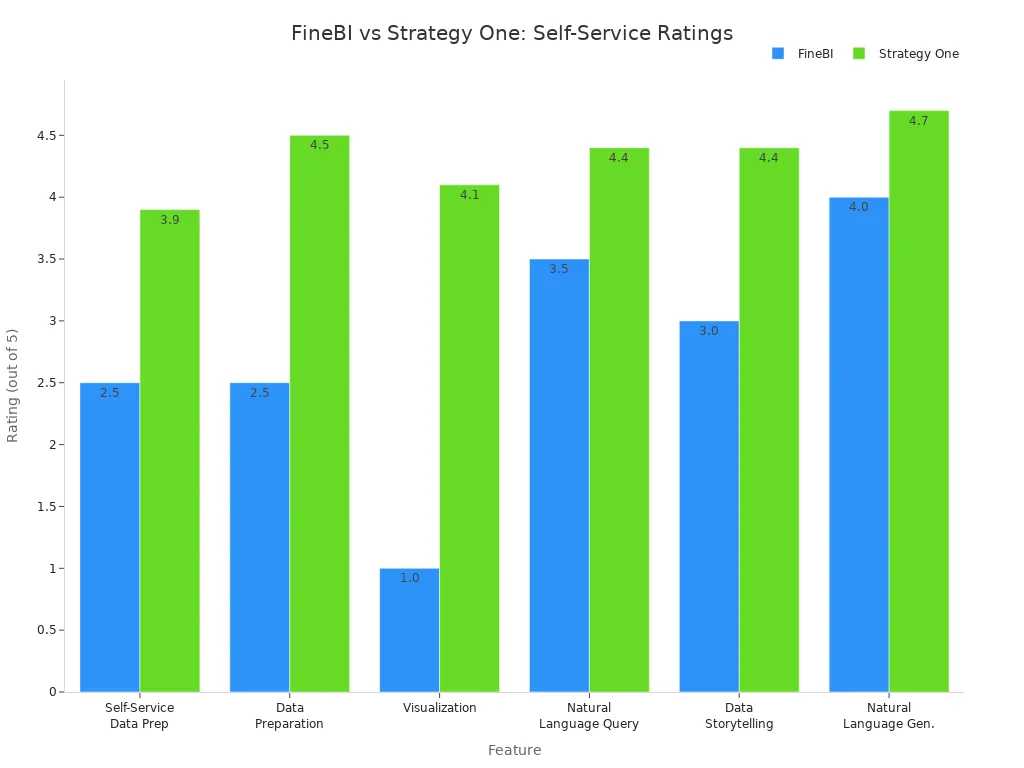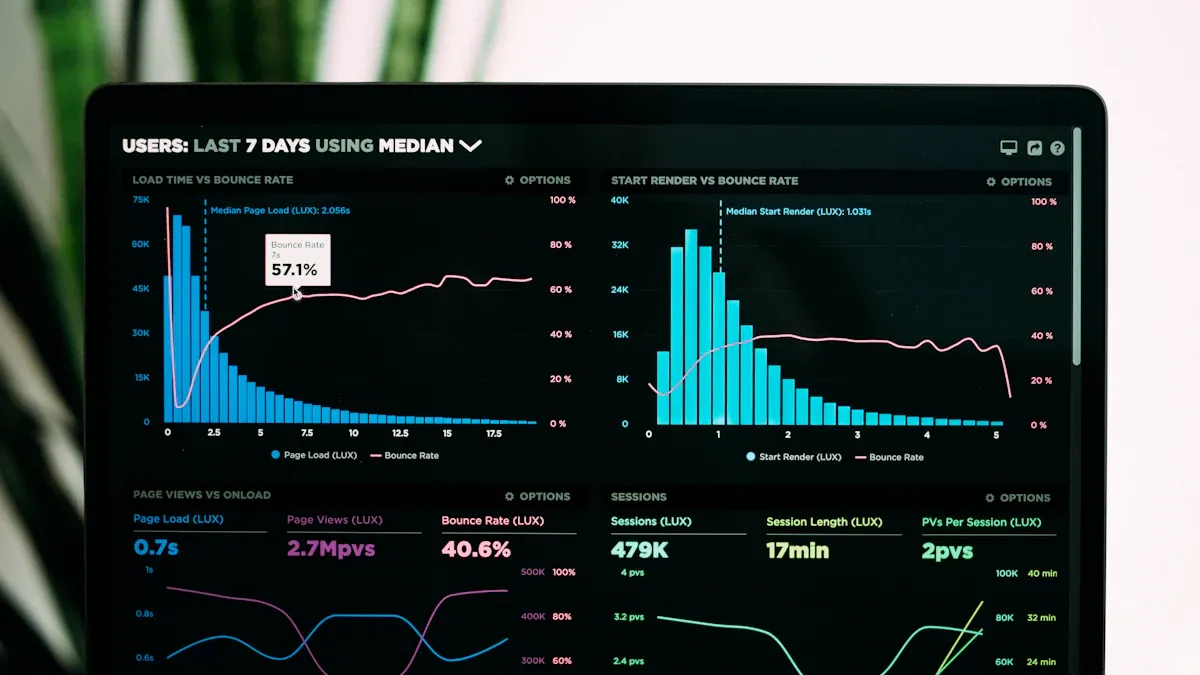Imagine a workplace where every major decision relies on precise insights. In 2025, a business intelligence specialist stands at the center of this transformation. This business intelligence role focuses on gathering, analyzing, and visualizing information to guide strategy. As organizations shift toward data-driven models, 83% of CEOs now aim to make their companies more data-driven. Nearly 79% of leaders expect data to play an even larger part in decision-making. The rapid adoption of business intelligence platforms like FineBI, known for real-time analytics and no-code simplicity, reflects this trend. Today, a data-driven professional uses modern business intelligence to deliver value faster than ever before.

A business intelligence specialist in 2025 manages a wide range of tasks that drive data-driven decision-making across organizations. These professionals serve as the bridge between raw data and actionable insights, ensuring that business leaders have the information they need to make informed choices. The following sections outline the core responsibilities that define this role.
Business intelligence analysts spend much of their time integrating data from multiple sources. They collect information from CRM systems, ERP platforms, web analytics, and external market data. Using methods such as ETL (Extract, Transform, Load) and ELT (Extract, Load, Transform), they clean, standardize, and consolidate data into centralized warehouses. Real-time data streaming and automation platforms allow them to aggregate information continuously, providing up-to-date insights for the organization. Security and governance remain top priorities throughout the integration process, ensuring data accuracy and accessibility.
FanRuan’s FineBI platform streamlines this process by offering a unified workspace for data integration. FineBI supports over 60 connectors, enabling seamless access to databases, cloud warehouses, and APIs. Its visual interface and real-time synchronization capabilities reduce manual effort and eliminate data silos, allowing business intelligence analysts to focus on higher-value tasks.
Once data is integrated, business intelligence analysts turn their attention to data analysis. They clean and prepare datasets, apply statistical techniques, and build models to uncover trends and patterns. Core methods include descriptive statistics, hypothesis testing, correlation analysis, and predictive modeling. Advanced analytics, such as machine learning and artificial neural networks, help forecast future outcomes and recommend optimal decisions.
Proficiency in SQL and other query languages remains essential, while cloud platforms provide scalable infrastructure for efficient analysis. FineBI enhances this process by enabling users to build self-service datasets, perform complex calculations, and validate results in real time. The platform’s intuitive tools empower both technical and non-technical users to conduct thorough data collection and analysis without extensive coding knowledge.
Data visualization and reporting are critical for translating complex findings into clear, actionable insights. Business intelligence analysts design dashboards and reports that track key performance indicators (KPIs) and operational metrics. They use a variety of visualization tools, including bar charts, line graphs, maps, and pivot tables, to present information in an accessible format.
| Tool Name | Target Users | Unique Features & Strengths |
|---|---|---|
| FineBI | Business users, analysts, IT | Self-service dashboards, real-time analytics, drag-and-drop interface, enterprise governance |
| Tableau Desktop | Data scientists, analysts | Flexible data visualization, joins multiple sources, large community support |
| Klipfolio | Business users needing dashboards | Easy dashboard creation, live data display, mobile app, pre-built components |
| Google Data Studio | Google ecosystem users | Seamless Google integration, free, large template library |
FineBI stands out by allowing users to create interactive dashboards with zero code. Its drag-and-drop functionality and responsive design ensure that insights are accessible on any device. Real-time filtering and collaboration features further enhance the reporting process, making it easier for business intelligence specialists to deliver timely, impactful results.
Collaboration is essential for maximizing the value of business intelligence. Business intelligence analysts work closely with departments such as marketing, sales, finance, and HR to align goals and share insights. They break down data silos by integrating sources across teams, promote data literacy, and encourage self-service analytics through user-friendly BI tools.
Key strategies include:
FineBI supports these efforts with features like role-based permissions, shared dashboards, and collaborative workspaces. Teams can annotate reports, discuss findings, and make collective decisions, all within a secure environment. This collaborative approach accelerates decision-making and drives better business outcomes.
Tip: Effective collaboration not only improves analysis quality but also fosters a culture of openness and innovation across the organization.
A business intelligence analyst in 2025 must master a broad set of technical skills. These include data modeling, data mining, and database management. Proficiency in statistical programming languages and coding remains essential. Business intelligence analysts also need experience with data visualization tools and reporting platforms. Familiarity with machine learning and understanding business regulations help them deliver accurate insights. FineBI’s user-friendly interface supports both technical and non-technical users. Its natural language queries and self-service modules allow business intelligence analysts to prepare and analyze data without extensive coding, making the platform accessible to a wider range of professionals.
Analytical abilities set top business intelligence analysts apart. They must excel at problem-solving, attention to detail, and critical thinking. Business intelligence analysts use these skills to spot trends, identify anomalies, and interpret complex data. They also need business savvy to understand industry-specific KPIs. FineBI’s step-by-step data preparation and visualization features help business intelligence analysts explore data relationships and communicate findings effectively.
| Skill Category | Description |
|---|---|
| Data Warehousing | Understanding storage and retrieval of BI data from repositories like data warehouses, lakes, and lakehouses. |
| Data Management | Skills in ETL, data quality improvement, and data modeling for business processes. |
| Data Preparation | Data collection, preprocessing, cleansing, transformation, and enrichment for analysis readiness. |
| Data Analysis | Querying, descriptive analytics, data mining, statistical and predictive analytics to find patterns and insights. |
| Data Visualization | Creating informative charts, dashboards, and storytelling to communicate insights effectively. |
| Programming | Proficiency in SQL and optionally Python, R, or other languages for data querying and management. |
| Communication | Clear verbal and written explanation of insights and collaboration with business users. |
| Critical Thinking & Problem-Solving | Analyzing data critically, solving issues, and exploring data with curiosity. |
| Attention to Detail | Ensuring accuracy, validity, and completeness of analytics results and project focus. |
Communication skills are vital for every business intelligence analyst. They must translate complex data into actionable insights for stakeholders with different backgrounds. Strong presentation and storytelling abilities help them engage audiences and drive decisions. Business intelligence analysts also use negotiation and active listening to align teams and secure buy-in. Poor communication can lead to costly mistakes and project delays. FineBI enhances collaboration by allowing users to share dashboards, annotate reports, and export findings, supporting clear and effective communication across departments.
Tip: Business intelligence analysts who master both technical and communication skills become trusted advisors in their organizations.
Certifications validate expertise and boost credibility for those pursuing how to become a business intelligence analyst. Employers in 2025 value credentials that demonstrate proficiency in data storytelling, analytics, and business strategy. Top certifications include Microsoft Certified: Power BI Data Analyst Associate, SAP Certified Application Associate, Tableau Business Intelligence Analyst Professional Certificate, and IBM Data Warehousing and BI Analytics. These programs cover data management, visualization, and business communication, preparing business intelligence analysts for high-value roles in data analysis and business intelligence.
| Certification Name | Issuer | Key Focus / Skills Validated |
|---|---|---|
| Microsoft Certified: Power BI Data Analyst Associate | Microsoft | Power BI for data analysis and business intelligence |
| SAP Certified Application Associate: SAP BusinessObjects BI Platform 4.3 | SAP | SAP BI platform systems |
| Tableau Business Intelligence Analyst Professional Certificate | Tableau | BI analytics skills |
| IBM Data Warehousing and BI Analytics (DWBIA) | IBM | Data warehousing and BI analytics |
| Database Design and Operational Business Intelligence Specialization | University of California Irvine | Database design and operational BI |
A business intelligence specialist plays a crucial role in shaping organizational strategy. By transforming raw data into actionable insights, business intelligence analysts help leaders make data-driven decisions at every level. They use visualization, interactive analysis, and predictive modeling to anticipate trends and guide proactive choices. Studies show that companies with strong business intelligence capabilities are five times more likely to make faster, better-informed decisions. Nearly 87% of organizations using analytics report positive impacts on their decision-making processes. Business intelligence analysts ensure that decisions align with both short-term needs and long-term goals, building trust in the process and driving measurable improvements in business performance.
Note: FineBI empowers business intelligence analysts to deliver real-time, actionable insights through intuitive dashboards and advanced analytics, accelerating the decision-making cycle.
Business intelligence analysts streamline operations by automating data collection and reporting. They reduce manual errors and save valuable time for teams. With real-time insights, managers can monitor key performance indicators and quickly identify inefficiencies or bottlenecks. Business intelligence tools like FineBI allow employees to focus on strategic tasks rather than repetitive data preparation. By analyzing operational data, business intelligence analysts help organizations optimize resource allocation, reduce waste, and improve productivity.
FineBI’s self-service features and real-time analysis capabilities enable business intelligence analysts to deliver timely, actionable insights that drive operational excellence.
Business intelligence analysts support business growth by uncovering opportunities and guiding strategic initiatives. Leading companies such as Amazon, Coca-Cola, and Starbucks use business intelligence to personalize customer experiences, optimize logistics, and predict market trends. These efforts result in higher customer retention, increased sales, and improved profitability. For example, Lotte.com used customer experience analytics to address checkout issues, resulting in $10 million in additional sales. Cementos Argos built a business analytics center to standardize finance processes and gain deeper customer insights, leading to higher profitability.
| Company | Challenge | BI Solution Implemented | Result / Business Growth Impact |
|---|---|---|---|
| Lotte.com | High shopping cart abandonment | Customer experience analytics | Increased loyalty, $10M sales growth |
| Cementos Argos | Need for competitive advantage | Business analytics center, data science teams | Standardized processes, higher profitability |
| Baylis & Harding | Need for better data visibility | BI tools for reporting and dashboards | Instant access to data, proactive decision-making |
FineBI enables business intelligence analysts to deliver actionable insights that support growth strategies, helping organizations stay ahead in competitive markets.
FineBI by FanRuan stands out as a modern business intelligence solution designed for both business intelligence analysts and business users. The platform simplifies data integration and analysis, making it easier for organizations to unlock the value of their data. FineBI uses a folder-based classification system that organizes information by business package subjects, which helps users understand complex datasets quickly. Flexible data modeling allows users to configure composite primary key linkages and create self-service datasets for joint analysis.
FineBI provides powerful visual data editing tools. Users can add columns, filter, sort, and merge data with minimal effort. The platform supports a wide range of functions, including logical, mathematical, date, text, aggregation, and DEF functions, enabling complex calculations without advanced coding. Data visualization in FineBI is based on The Grammar of Graphics, supporting multi-dimensional exploratory analysis with customizable chart types and interactive dashboards. Dashboards feature adaptive layouts, theme customization, web components, filters, and multi-tab support, offering comprehensive data presentation.
Collaboration is a core strength of FineBI. The platform enables subject collaboration with shared permissions, data sharing with admin review, and dashboard sharing via public links. These features enhance teamwork and make data accessible across departments. Business intelligence analysts benefit from step-by-step self-service data preparation, real-time preview, and easy tracking of changes, which streamline the data exploration process.
Tip: FineBI’s intuitive design and collaborative features empower business intelligence analysts to deliver insights faster and more efficiently.
Enterprises in 2025 rely on a variety of business intelligence tools to meet their analytical needs. Popular platforms include ThoughtSpot, Power BI, Tableau, Looker, SAP BusinessObjects, Sisense, Domo, QlikSense, Yellowfin, and Oracle Analytics Cloud. Each solution offers unique strengths, such as AI-powered analytics, seamless integration with existing ecosystems, and advanced data visualization capabilities.
| BI Platform | Key Strength / Usage Focus | Notable Features / Reasons for Popularity |
|---|---|---|
| ThoughtSpot | AI-powered analytics and natural language queries | AI-driven self-service analytics, interactive visualizations, augmented analytics with AI Analyst (Spotter) |
| Power BI | Traditional dashboards, Microsoft ecosystem | Data visualization, data transformation, collaboration, strong integration with Microsoft products |
| Tableau | Data visualization | Interactive and shareable dashboards, ease of use, supports wide range of data sources |
| Looker | Semantic modeling layer | Consistent business metrics definition, integration with modern data warehouses, embedded analytics |
| SAP BusinessObjects | Enterprise reporting | Robust reporting capabilities, integration with SAP ecosystem |
| Sisense | Embedded analytics | Data blending, modeling, visualization, advanced analytics, embedding into apps and portals |
| Domo | Basic data analysis | Reporting, dashboards, mobile accessibility, collaboration, cloud-native architecture |
| QlikSense | Data exploration | Associative data modeling, interactive visualizations, AI and ML capabilities |
| Yellowfin | Basic visualization | Interactive dashboards, collaboration, automated insights, data storytelling |
| Oracle Analytics Cloud | Workflow streamlining | Data preparation, advanced analytics, visualization, collaboration, integration with Oracle ecosystem |
Business intelligence analysts often compare platforms based on self-service capabilities, visualization options, and collaboration features. The chart below illustrates how FineBI and Strategy One rate across key self-service BI features.

FineBI provides step-by-step modules for data preparation, grouping, calculating, and joining datasets. Users appreciate the ability to preview changes in real time and track each step, which supports easier data exploration. While other platforms like Strategy One offer more mature self-service features, FineBI’s strengths lie in its intuitive interface, collaborative dashboards, and flexible data modeling. Business intelligence analysts choose FineBI for its balance of usability, integration, and advanced data visualization.

Artificial intelligence and automation are transforming the business intelligence landscape. Machine learning, natural language processing, and generative AI now play a central role in daily workflows. These technologies automate data preparation, cleansing, and reporting, which reduces manual work and increases accuracy. AI enables business intelligence specialists to identify patterns, forecast trends, and generate personalized insights. Natural language processing allows users to interact with data using plain English, making analysis more accessible to non-technical staff. Automation also ensures consistency and reduces human error, leading to more reliable insights. As a result, business intelligence specialists can focus on strategic interpretation rather than routine tasks.
| Transformation Aspect | Description |
|---|---|
| Automation of Manual Tasks | AI automates data preparation, cleansing, and reporting, reducing time spent on repetitive manual work. |
| Enhanced Accuracy | Automation reduces human error, improving the precision of data insights. |
| Faster Decision-Making | AI streamlines workflows enabling quicker, more confident business decisions. |
| Personalized Insights | Generative AI creates tailored insights for specific organizational needs. |
| Natural Language Interaction | NLP allows BI specialists to query and analyze unstructured data using natural language, simplifying analysis. |
| Predictive and Prescriptive Analytics | AI enables forecasting and recommendations to anticipate future trends and guide strategic goals. |
FanRuan’s FineBI integrates AI, machine learning, and natural language processing to automate data preparation, predictive analytics, anomaly detection, and report generation. These features empower users to become citizen data scientists and support a data-driven culture.
Real-time analytics has become a critical enabler for business intelligence. Organizations now process data as it is generated, allowing them to make decisions based on the most current information. This immediacy improves operational efficiency, supports timely problem detection, and reduces manual interventions. Companies using real-time analytics report faster decision-making, improved financial performance, and increased customer satisfaction. For example, Starbucks and Netflix use real-time data to personalize customer experiences and boost retention rates. FineBI supports real-time data integration and analysis, enabling businesses to respond quickly to market changes and operational needs.
Note: Real-time analytics helps organizations avoid risks, capitalize on opportunities, and maintain a competitive edge.
The role of the business intelligence specialist continues to evolve with technology. Augmented analytics now automates data preparation and insight generation, making analysis faster and more accessible. Natural language processing allows users to interact with data using everyday language, expanding access to insights. Data storytelling has become a vital skill, helping specialists provide context and actionable recommendations. Self-service analytics empowers non-technical users to perform their own analysis, reducing reliance on specialized teams. New roles such as AI product managers and algorithm engineers are emerging, requiring interdisciplinary knowledge and a focus on ethical and regulatory compliance. FanRuan updates FineBI regularly to help enterprises manage complex data systems and stay ahead in digital transformation.
Tip: Continuous learning and collaboration are essential for business intelligence specialists to thrive in this rapidly changing environment.
Business intelligence specialists in 2025 play a vital role in shaping data-driven organizations. FineBI empowers these professionals to deliver greater value by:
Professionals pursue BI careers for many reasons:
Industry leaders expect self-service BI, AI automation, and embedded analytics to define the future. Business intelligence will continue to drive innovation and strategic growth across every industry.
What Does a Business Intelligence Developer Do in 2025
What Does a Business Intelligence Engineer Do in 2025
Top Business Intelligence Tools to Explore in 2025
Companies in manufacturing, retail, finance, healthcare, and technology hire business intelligence specialists. These professionals help organizations use data to improve operations, increase profits, and stay competitive.
FineBI offers a no-code, drag-and-drop interface. Users can connect data, build dashboards, and analyze trends without programming skills. The platform’s guided workflows and natural language queries make analytics accessible to everyone.
FineBI supports real-time data integration and analysis. Users can monitor live metrics, receive instant alerts, and make timely decisions based on the latest information.
Certifications from Microsoft, Tableau, SAP, and IBM validate skills in analytics, reporting, and data management. These credentials help professionals stand out and advance in their careers.

The Author
Lewis
Senior Data Analyst at FanRuan
Related Articles

What is a Business Intelligence System and How Does It Work
A business intelligence system collects, analyzes, and visualizes data, turning raw information into actionable insights for smarter business decisions.
Lewis
Jan 04, 2026

Top 3 Retail Management Software Picks
Compare the top 3 retail management software. See features, pricing, and which solution fits your business needs for inventory and sales.
Lewis
Dec 30, 2025

What Are Enterprise BI Solutions and How Do They Work
Enterprise BI solutions unify business data, enabling real-time analytics, secure collaboration, and smarter decision-making across your organization.
Lewis
Dec 22, 2025